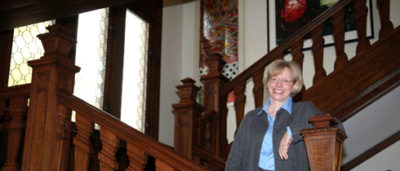Setting the standard
Joan Gallos, Ed. D., UMKC Professor of Leadership and Director of the Executive MBA program at the Henry W. Bloch School of Business and Public Administration, was recently named a University of Missouri Curators’ Teaching Professor of Leadership by the UM Board of Curators. At the recommendation of President Gary Forsee and after review at the campus and system levels, the Board confirmed the appointment in September.
This is the first Curators’ appointment for UMKC since 2005 and the first for the Bloch School.
A Curators’ Professorship is the highest academic rank awarded by the UM System to a select few scholars with extraordinary records of professional accomplishment.
Question & Answer:
Q. Looking back at your career, what would you identify as your proudest achievement?
A. I appreciate the opportunities I have had through my scholarship, my work with colleagues in the larger academy, and my professional service to help shape the dialogue about teaching and learning in management education and about what it means to educate professionals for effective practice.
Throughout my career, I have thought about what leaders, managers, and administrators need to know in order to perform well in a diverse and increasingly complex work world and about how that translates into educational programs, pedagogy, and practices.
Another achievement would be the books I have published. I love teaching through writing! My edited volumes, “Business Leadership” and “Organization Development,” have been well-received and used by academic and practitioner audiences around the world. In addition, “Teaching Diversity: Listening to the Soul, Speaking from the Heart” anticipated well the challenges and opportunities in preparing students for a diverse, global world.
Each book takes a field that is multi-disciplinary and broad in scope and purpose; identifies the essence of what we know and need to know; and frames and organizes that information to offer others easy access to it. Each book project also enabled me to immerse myself into an area of great interest and learn about it, to understand and draw out the thinking of top scholars and practitioners, and to share that with others. What great fun and opportunity to learn!
Q. Your Nomination Portfolio presented to the Curators included many remarks by your former students. Describe what is special about your leadership classes – what do students come away with that is different from what they might acquire from other classes?
A. Students regularly say three things:
I help them decompose complex processes – like how to lead, how to learn, how to diagnose organizations and social situations, and how to develop what I call higher order thinking skills – and improve the quality of their work and daily lives. In the process, students learn that progress and success are attainable to all. I have a strong theory to practice orientation which impacts what and how I teach.
Students are encouraged to make learning personal. Success comes not from what you know, but rather from what you do with what you know. I challenge students to understand their reasoning and their worldviews – and how those may be different from the reasoning and worldviews of others. I try to embrace the world as a reflective practitioner and encourage my students to do so, as well.
In a world where knowledge learned today can be obsolete tomorrow, there is nothing more important than learning to learn. That belief underpins all that I do in the classroom. I am passionate about learning, and students find that contagious.
Q. What prompted you to be in the academic community, rather than the business community?
A. I love the creativity, autonomy, and the intellectual freedom at the heart of faculty life. There is nothing more glorious for me than a work day where I sit uninterrupted at my computer thinking and writing from dawn to dusk.
Q. Why did you choose “leadership” as a point of interest to teach?
A. I met the great organizational theorist, Chris Argyris, on the first day of graduate school and became intrigued by his theories of professional effectiveness. I’ve been hooked ever since….
Q. What would your students and/or your colleagues be surprised to know about you?
A. I am very shy by nature – a highly-skilled introvert, is how a colleague once described me.

